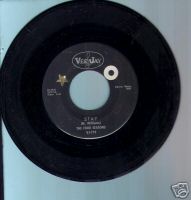Maurice Williams original version
The song was written by Williams in 1953 when he was 15 years old. He had been trying to convince his date not to go home at 10 o'clock as she was supposed to. He lost the argument. However, as Williams was to relate years later, "Like a flood, the words just came to me."
In 1960, the song was put on a demo by Williams and his band, the Zodiacs, but it attracted no interest until an eight-year-old heard it and impressed the band members with her positive reaction to the tune. [2] The band's producer, Phil Gernhard, took it along with some other demos to New York City and played them for all the major record producers that they could access. Finally, Al Silver of Herald Records became interested, but insisted that the song be re-recorded as the demo's recording levels were too low. They also said that one line, "Let's have another smoke" would have to be removed in order for the song to be played on commercial radio. After the group recorded the tune again, it was released by Herald Records and was picked up by CKLW radio. It entered the U.S. Billboard Hot 100 on October 3, 1960, and reached the number one spot on November 21, 1960. It was dislodged a week later by Elvis Presley's "Are You Lonesome Tonight?". On the Herald recording, Williams sang lead and Henry Gaston sang the falsetto chorus.
The original recording of "Stay" was the shortest single ever to reach the top of the American record charts at that time, at 1 minute 36 seconds.
By 1990, it had sold more than 8 million copies. Its popularity revived when the Dirty Dancing soundtrack included it.
This page is based on this
Wikipedia article Text is available under the
CC BY-SA 4.0 license; additional terms may apply.
Images, videos and audio are available under their respective licenses.



